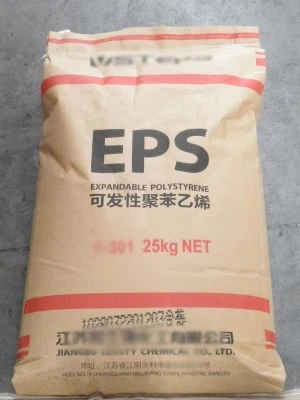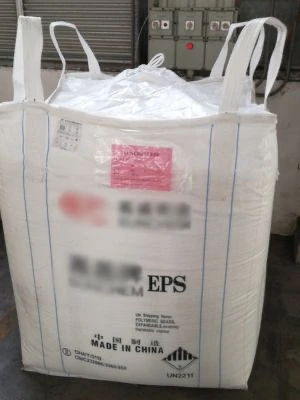High Flame Retardant Expandable Polystyrene (EPS)
High Flame Retardant EPS Resin Bead
High Flame Retardant Grade EPS is a premium material renowned for its superior flame retardant capabilities. It has achieved accreditation from the UL laboratory and also holds the B1 certification from the Dujiangyan National Fireproof Building Materials Quality Inspection Center. This product line features enhanced flame retardant properties, a high expansion ratio, and fast processing speeds. It produces items with a low shrinkage rate and a broad operational range during manufacturing, making it suitable for a variety of equipment, including various plates, automatic machines, and manual presses.
| Model | CF-103 | CF-104 | CF-105 | CF-106 | CF-107 | CF-108 |
|---|---|---|---|---|---|---|
| Bead Size (mm) | 1.00-1.60 | 0.85-1.25 | 0.70-1.00 | 0.50-0.80 | 0.40-0.60 | 0.30-0.50 |
| Foam Density (g/L) | 11-14 | 12-15 | 13-17 | 14-18 | 15-18 | 20-28 |
| Sieve Analysis Efficiency | 95% | 95% | 95% | 95% | 95% | 95% |
| Pentane Content | >6% | >6% | >6% | >6% | >6% | >6% |
| Residual Monomer | ≤0.3% | ≤0.3% | ≤0.3% | ≤0.3% | ≤0.3% | ≤0.3% |
| Moisture Content | ≤1.0% | ≤1.0% | ≤1.0% | ≤1.0% | ≤1.0% | ≤1.0% |
High Flame Retardant Grade EPS is extensively used across multiple sectors. It is crucial for building insulation materials, serves as electrical and structural parts, and is employed as lightweight filling materials. It is also highly effective for the packaging of precision electronic equipment, where robust fire resistance is essential.
High Flame Retardant EPS Process
The manufacturing process of Expanded Polystyrene (EPS) involves three main stages: pre-expansion, aging, and molding. Initially, raw polystyrene beads containing a blowing agent are heated in a pre-expander, where they expand significantly. Next, these expanded beads are transferred to aging silos to stabilize and allow air to replace some of the blowing agent, enhancing their strength and stability. Finally, the aged beads are placed into molds and subjected to steam, causing them to expand further and fuse together into the desired shape. This process utilizes equipment such as pre-expanders, aging silos, and various molding machines, ensuring the EPS products are lightweight, insulative, and maintain their form.
Pre Expending
EPS pre-expansion is a process used to manufacture polystyrene foam by heating polystyrene beads containing a blowing agent, causing them to expand. During this process, the beads soften at temperatures around 90℃, the blowing agent vaporizes and generates gas, which leads to the beads expanding several times their original volume.
| Main steam pressure (Kg/cm²) | 5-6 |
| Steam pressure for pre-expanding (Kg/cm²) | 1.0-1.2 |
| Temperature in vessel (℃) | 108-110 |
| Feedstock (KG) | 15-18 |
| Heating time (s) | 40-48 |
| Density (g/L) | 10.5-13.5 |
Aging
During the pre-expansion process, the blowing agent evaporates within the beads, and the incorporated blowing agent and water vapor condense into a liquid after exiting the expander. This liquid then dissolves into the styrene monomer, creating a vacuum inside the beads. Therefore, to achieve pressure balance inside and outside the beads, which grants EPS good flexibility and perfect shape, the beads should be stored in a well-ventilated silo for a certain period of time, allowing air to enter the beads.
| Aging Time | 3-4 Hours |
Molding Processing
After aging, fill the EPS into a sealed mold. Inject steam directly into the mold through its holes for a very brief period. As the beads are heated, the blowing agent within them evaporates, causing the beads to soften and expand. These expanded beads fill the entire space of the mold and fuse together due to the confines of the mold. Subsequently, cool and shape the material. The molded products are completed once the mold is released.
| Main steam pressure (Kg/cm²) | 5-7 |
| Air pressure (Kg/cm²) | 5-7 |
| Cooling water pressure (Kg/cm²) | 3.5-5 |
| Penetrating pressure (Kg/cm²) | 0.5-0.65 |
| Molding pressure (Kg/cm²) | 0.5-0.63 |
| Mold fixing pressure (Kg/cm²) | 0.4-0.5 |
| Mold moving pressure (Kg/cm²) | 0.35-0.45 |
| Penetrating heating time (s) | 11-17 |
| Molding heating time (s) | 6-10 |
| Heat preserving time (s) | 5 |
| water cooling time (s) | 15-25 |
| Draining time (s) | 2-5 |
| Sealed time (s) | 10-15 |
| Cycle time (s) | 130-150 |
EPS Packing
EPS resin beads are available in two packaging options: 25 kilograms per bag and 850 kilograms per bag. A 20-foot container can accommodate up to 17 tons, while a 40-foot container can hold up to 25.2 tons.

